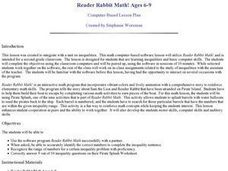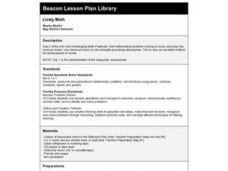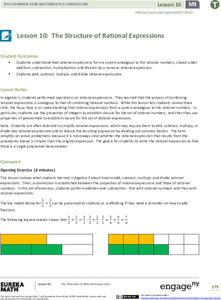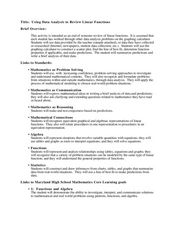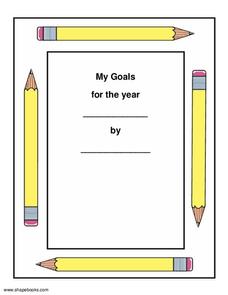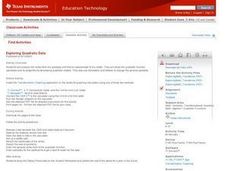Curated OER
Reader Rabbit Math!
Students engage in an integrated lesson with a unit on inequalities.This math computer-based software lesson will utilize Reader Rabbit Math! The lesson is designed for students that are learning inequalities and basic computer skills.
Mathematics Assessment Project
Generalizing Patterns: The Difference of Two Squares
After completing an assessment task where they express numbers as the difference of squares (i.e., 9 = 5^2 – 4^2), class members note any patterns that they see in the problems.
Mathed Up!
HCF, LCM, and Product of Primes
Give the class a prime example of using prime numbers. After reviewing prime factorization of numbers with the video, pupils use their knowledge to determine greatest common factors and least common multiples in the worksheet. The...
Mathed Up!
Bearings
Keep the math straight and true. Using information learned about angle relationships, pupils determine drawn bearings, or draw a line with a given bearing. The accompanying video provides the definition of a bearing and its three...
Curated OER
Lively Math
Scholars realize the importance of reading and correct interpretation when engaging in mathematical problem solving. This begins with the understanding of vocabulary and the translation from numeric to algebraic and algebraic to numeric.
CK-12 Foundation
Intermediate Value Theorem, Existence of Solutions: Function Exploration
Does the value exist? The interactive allows pupils to visualize the Intermediate Value Theorem. Using the visualization, individuals respond to questions using specific values and general values. The class comes to the conclusion what...
College Board
2008 AP® Statistics Free-Response Questions Form B
To know what is on the test would be great. The six free-response question from the second form of the 2008 AP® Statistics gives pupils an insight into the format and general content of the exam. Each question requires the test taker to...
EngageNY
The Structure of Rational Expressions
Find out when rational expressions are closed. Pupils review adding, subtracting, multiplying, and dividing with rational numbers to make the connections to operations with rational expressions. Using specific examples, learners notice...
Curated OER
Using Data Analysis to Review Linear Functions
Using either data provided or data that has been collected, young mathematicians graph linear functions to best fit their scatterplot. They also analyze their data and make predicitons based on the data. This lesson is intended as a...
Oregon Department of Education
Building and Expanding Patterns
The generation of a number, or shape pattern, is the focus of this math activity. Pupils are presented with a variety of patterns shapes, and number patterns, then use worksheets embedded in the plan to gain further practice. The...
Curated OER
Algebra: Coordinates and Straight Line Graphs
Young mathematicians review what they have previously learned about coordinates and straight line graphs. Then, they access an interactive component within the instructional activity to gain more practice with this skill. Additionally,...
College Board
AP Calculus: Slope Fields
Ready to field questions about slope fields? An article on AP® Calculus teaching methods describes how to teach about slope fields to solve differential equations. It gives some sample problems to consider with the class and how to...
abcteach
My Goals for the Year
Set up your learners for success by requiring them to write goals at the beginning of the year. Pupils fill out their goals for math, reading, handwriting, science, social studies, and writing as well as goals for friend and family...
EngageNY
From Ratio Tables to Double Number Line Diagrams
How much sugar is in one bottle? Pupils use double number line diagrams to determine the amount of sugar in a 1L bottle of cola. The teacher leads a discussion on ways that double number lines can be of assistance in solving a problem...
Curated OER
Math All Around Us!
Students find math concepts in every day items. In this math concept instructional activity, students take ten photographs of things they find interesting. They analyze the photographs to find hidden math concepts such as counting,...
EngageNY
Definition and Properties of Volume
Lead a discussion on the similarities between the properties of area and the properties of volume. Using upper and lower approximations, pupils arrive at the formula for the volume of a general cylinder.
Mathematics Vision Project
Features of Functions
What are some basic features of functions? By looking at functions in graphs, tables, and equations, pupils compare them and find similarities and differences in general features. They use attributes such as intervals of...
EngageNY
Properties of Logarithms
Log the resource on logarithms for future use. Learners review and explore properties of logarithms and solve base 10 exponential equations in the 12th installment of a 35-part module. An emphasis on theoretical definitions and...
Curated OER
Fibonacci II
Study Fibonacci sequences and see a related set of numbers. Learn and review Lucas numbers and use of quadratic equations to find a general term of a sequence of numbers that is generated by a recurrence relation similar to Fibonacci's.
Curated OER
Exploring Quadratic Data : Transformation Graphing
High schoolers analyze the vertex form of a parabola and find an approximate fit of a model. They explain the quadratic parabola function and its properties by developing quadratic models. They use translation and dilation to change the...
EngageNY
Complex Number Division 1
Conjugating in the math classroom — and we're not talking verbs! The seventh activity in a series of 32 introduces the class to the building blocks of complex number division. During the instruction, the class learns to find the...
Balanced Assessment
Para-Ball-A
Analyze the flight of a thrown ball. Learners determine the maximum height of a thrown ball and the time it takes to hit the ground given its initial speed. They continue to review different scenarios with different maximums or different...
Curated OER
Linear Programming
Students explore inequalities to determine the optimal solution to maximize a profit for a company. For this linear programming lesson, students discover how to graph inequalities and how to determine the algebraic representation of a...
Curated OER
Using Random Sampling to Draw Inferences
Emerging statisticians develop the ability to make inferences from sample data while also working on proportional relationships in general. Here, young learners examine samples for bias, and then use random samples to make inferences...


